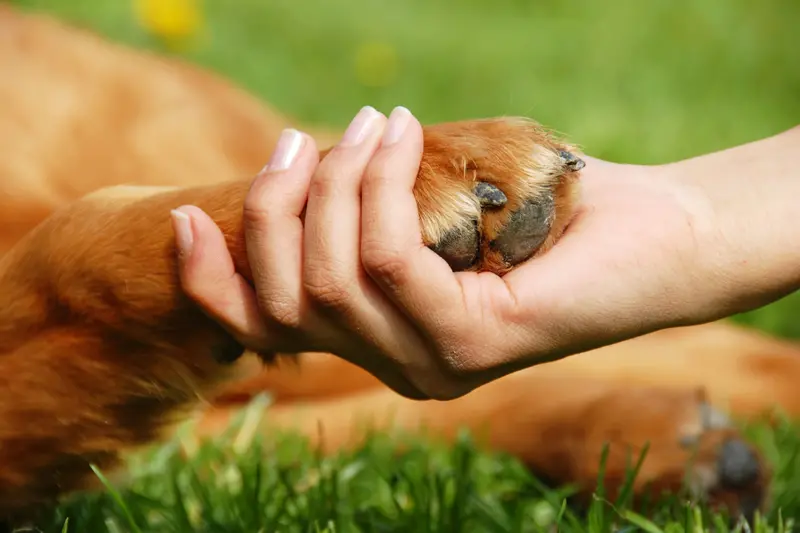Tips to Protect Your Dog’s Paws from Hot Pavement

Many owners like taking their dogs on walks to enjoy the warm summer weather with them, but many of them forget about one important detail: hot pavement can and will burn a dog’s paws. It can be tempting to take your dog everywhere you go, but it can cause serious harm to your dog if you are not careful. Remember that if asphalt and cement can get hot enough to cook an egg during the summer or if it feels way too hot for you to leave your hands comfortably on the ground for at least 10 seconds, it can result in nasty burns on your dog’s paw pads. This is especially true if you have a new puppy with tender young paws.
Here are some tips to keep your dog or puppy from getting burned this summer.
1. Walk Your Dog When It’s Cool
This is probably an obvious tip but one that folks sometimes don’t consider enough. It’s a great idea to take your dog out on daily walks, but be mindful of when and where you walk him. The best time to walk your dog is in the morning or late evening, when the pavement is cool. Avoid walking your dog in the afternoon when the sun is high in the sky or early evening, because the pavement will be hot.
2. Toughen Your Dog’s Paws
When it’s time to walk your dog, it can actually be a good idea to stick to the pavement during the cool times of the day. While the pavement is cool, it won’t burn your dog’s paws, and it will also help to toughen them up. This will help to prevent any potential burns that could come later on.
3. Stay On The Grass
If you end up taking your dog out during the warmer times of the day, be sure to stay on the grass and stick to shady areas. Stay away from sidewalks or any paved areas to avoid burning. A shady park can be a great place to take your dog on a warm afternoon.
4. Moisturize Your Dog’s Paws
Consider moisturizing your dog’s feet daily to help prevent injuries like cuts, cracking, or peeling of the paws. Minor injuries like this can make your dog’s paws more susceptible to burns and other serious problems.
5. Use Paw Wax
Paw wax can easily be smeared onto your dog’s paw pads to protect them from harmful surfaces. Paw wax is designed to protect your dog’s feet from hot surfaces and potentially harmful chemicals like road salts. (If you need something right away, you can try some Vaseline. It is not nearly as good but better than nothing.)
6. Dog Shoes
Dog shoes are one of the best ways to protect your dog’s paws from heat and potential injuries if your dog will wear them. If this seems like the right solution for your dog, be sure to buy shoes that have rubber soles to offer the best protection. Be aware that not all dogs can get used to dog shoes, and some might have a hard time walking in them. There will definitely be an adjustment period for your dog with dog shoes. If you can get your dog used to using them, nothing else offers better protection. Disposable dog booties are a great short-term fix for the summer heat. Dog booties can provide good protection from the heat, and are a great temporary solution if you need to take your dog out on a hot day and your dog is willing to wear them.
7. Peel And Stick Pads
Peel and stick felt pads are a quick solution to minimize the dangers of hot pavement. They’re easy to stick onto the pads of your dog’s feet and they help protect against potential burns and injuries. They can even reduce the risks of your dog slipping on slick surfaces. And even better alternative to the felt pads may be silicone scar pads or tape. They are so easy to put on and they can be cut to the perfect size for paws. They can be reused and they do well and stay on in wet conditions. They are so thin, flexible and durable that your dogs should not have any problems wearing them unlike many other things you put on their paws. Silicone scar sheets can be a terrific option for your dog’s paws.
8. Socks
Socks are a decent last minute solution if you need to take your dog onto the hot pavement. Like dog shoes, not every dog will tolerate wearing socks. You can just take a pair of your old socks or little baby socks and see if they will work. You should be watchful when putting socks on your dog’s feet, as some dogs will be tempted to chew them.
9. Check Their Paws Carefully
Be sure to check your dog’s paw pads daily for any signs of damage and wash his paws frequently. If you do happen to see a problem, or if your dog is acting strangely on his feet, be sure to have him taken to the vet to see how bad the injury is.
How to Tell If Your Dog’s Paws Are Hurting
Your dog’s paws have footpads that can usually handle whatever a stroll or walk in nature throws at them. But a lot of human-made surfaces can burn your pooch’s paws, including concrete, metal, pavement, sidewalks and asphalt.
Dogs showing these symptoms may have burned paws:
● Limping or avoiding walking
● Licking or chewing feet
● Paw pads are darker in color than usual
● Pads are visibly damaged
● Blisters or redness
First Aid for Burned Paws
If you suspect your dog has burned paw pads:
● Bring your dog inside right away. Carry your pet if necessary
● Flush the foot with cold water or use a cold compress
● Try not to let your dog lick the injured pad
Take your dog to the vet as soon as you possible because burns can become infected. Your dog might need antibiotics or pain medication depending on the severity of the burn. The vet can also rule out other possible causes of the symptoms. Paw licking can also be a sign of other problems, such as allergies.
These tips will help your dog stay safe and uninjured this summer from the dangers of hot pavement. Happy Summer!
Share This Post
Recent Posts
About Shallowford Animal Hospital
Shallowford Animal Hospital and The Pet Spa at Shallowford are dedicated to the exceptional, compassionate care your pet deserves. Pets hold a very special place in our families, and we treat yours like our own.



